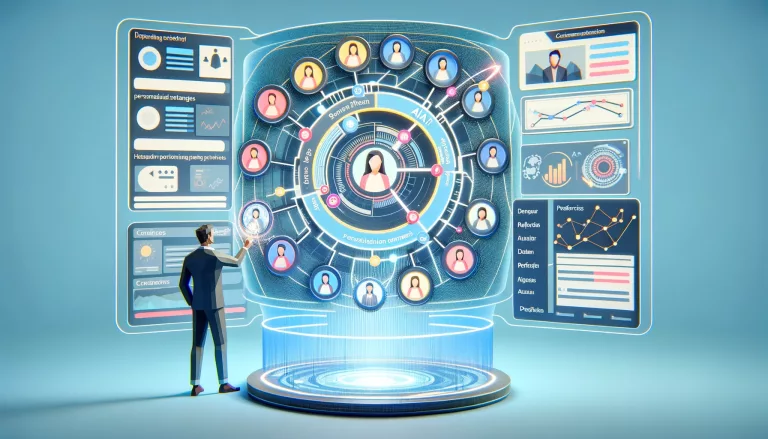In the ever-evolving landscape of marketing, the integration of artificial intelligence (AI) is reshaping how brands connect with consumers. As we transition from traditional marketing methods to more sophisticated strategies, hyper-personalization emerges as a game-changer. This blog post explores the role of AI algorithms in crafting hyper-personalized marketing campaigns, highlighting their benefits, challenges, and future potential.

Understanding Hyper-Personalization
Hyper-personalization takes personalized marketing to an entirely new level. Unlike traditional personalization, which often segments customers into broad categories, hyper-personalization focuses on individual preferences and behaviors. By leveraging advanced AI algorithms and real-time data analytics, businesses can create tailored experiences that resonate deeply with each customer.
Key Components of Hyper-Personalization:
- Data Collection: Gathering extensive data from various sources such as browsing history, purchase behavior, and social media interactions.
- Predictive Analytics: Using historical data to predict future customer behaviors and preferences.
- Real-Time Adjustments: Continuously analyzing data to refine marketing strategies on-the-fly.
With these components in place, businesses can deliver messages that feel personal and relevant, significantly enhancing customer engagement and loyalty.
The Role of AI Algorithms in Marketing
AI algorithms are at the core of hyper-personalized marketing. They analyze vast amounts of data to identify patterns that inform marketing strategies. Here are some essential AI technologies driving this transformation:
- Machine Learning (ML): ML algorithms learn from data over time, improving their predictions about customer behavior. This enables marketers to craft messages that resonate more effectively with individual consumers.
- Natural Language Processing (NLP): NLP allows machines to understand human language nuances. This technology can analyze customer feedback and sentiment from various channels, helping marketers refine their messaging accordingly.
- Recommendation Engines: These algorithms suggest products or content based on user behavior and preferences. Companies like Amazon and Netflix have successfully utilized recommendation engines to enhance user experience and drive sales.
By implementing these technologies, marketers can create campaigns that not only reach their audience but also engage them on a personal level.
Benefits of Hyper-Personalized Marketing Campaigns
The advantages of adopting hyper-personalization through AI algorithms are substantial:
- Enhanced Customer Experience: Customers receive tailored content that aligns with their interests, leading to a more satisfying interaction with the brand.
- Increased Engagement: Personalized messages capture attention more effectively than generic ads. When consumers feel understood, they are more likely to engage with the content presented to them.
- Higher Conversion Rates: Targeted campaigns lead to better conversion rates as consumers are presented with offers that meet their specific needs at the right time.
- Improved ROI: Companies that excel in personalization can generate significantly higher revenue compared to those that do not leverage these strategies effectively. Research indicates that businesses focusing on personalized marketing can see up to 40% more revenue from their efforts.
- Scalability: AI algorithms can handle vast amounts of data efficiently, allowing brands to implement personalization at scale without sacrificing quality.
Challenges in Implementing Hyper-Personalization
While the benefits are clear, several challenges must be addressed when implementing hyper-personalized marketing campaigns:
- Data Privacy Concerns: With increasing scrutiny over data usage and privacy regulations like GDPR, marketers must navigate these waters carefully to maintain consumer trust while delivering personalized experiences.
- Integration Complexity: Combining various data sources and ensuring they work seamlessly with AI algorithms can be technically challenging for many organizations.
- Cost Implications: Implementing advanced AI technologies may require significant investment in both software and talent. Smaller businesses may find it difficult to allocate resources for such initiatives.
Despite these challenges, the potential for hyper-personalization remains promising for brands willing to invest in the necessary tools and strategies.
The Future of Hyper-Personalized Marketing
As technology continues to advance, the future of hyper-personalized marketing looks bright. Several trends are likely to shape this landscape:
- Increased Use of AI and Machine Learning: As AI technologies evolve, they will become even more adept at analyzing complex datasets and predicting consumer behavior accurately.
- Real-Time Personalization: The ability to adjust marketing strategies in real-time based on consumer interactions will become increasingly vital as customer expectations continue to rise.
- Greater Focus on Ethical Marketing Practices: Brands will need to prioritize transparency regarding data usage while balancing personalization efforts with ethical considerations related to consumer privacy.
- Omnichannel Marketing Strategies: Integrating various channels (e.g., social media, email, websites) will allow brands to create cohesive experiences that resonate across different touchpoints
In conclusion, AI algorithms are revolutionizing how brands approach marketing by enabling hyper-personalization at an unprecedented scale. As businesses continue to harness these technologies, they will not only enhance customer experiences but also drive significant growth in engagement and revenue.
